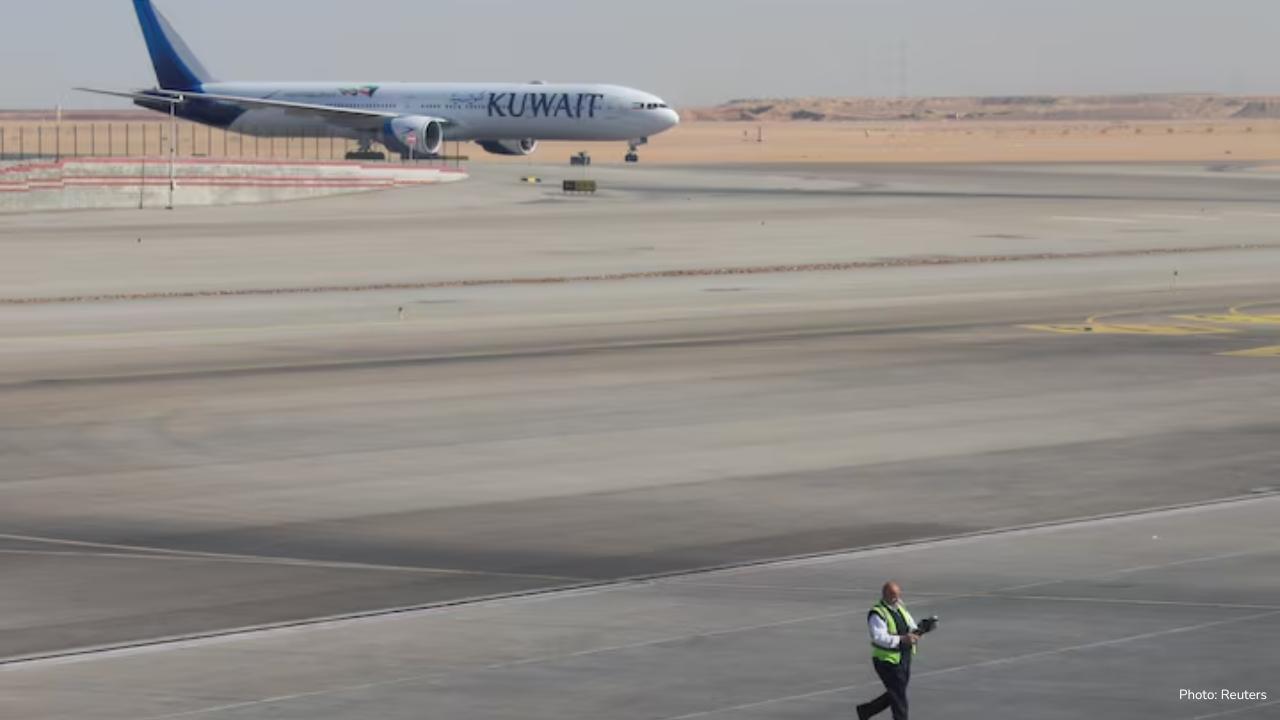
Post by : Monika
Kuwait Airways, the national airline of Kuwait, has announced a major capital restructuring plan to address its significant financial losses. The airline is taking this step after years of accumulated deficits, aiming to strengthen its financial position and prepare for future growth. The restructuring involves reducing and increasing the airline's capital, adjustments to legal reserves, and support from the state-owned Kuwait Investment Authority.
Background: Financial Challenges
Kuwait Airways has faced financial difficulties for several years. These challenges include accumulated losses totaling around $983 million, delays in aircraft deliveries, and operational challenges caused by regional geopolitical tensions. The airline has also been affected by broader challenges in the aviation industry, including the long-term effects of the COVID-19 pandemic, which reduced passenger demand and caused travel disruptions.
Because of these factors, Kuwait Airways has struggled to generate profits. The airline has not yet released its financial results for 2023 and 2024, which indicates ongoing challenges in stabilizing its operations.
Details of the Capital Restructuring
The airline’s shareholders approved a plan on September 2, 2025, to restructure its capital. This plan involves several key steps:
Reduction of Paid-Up Capital:
Kuwait Airways reduced its paid-up capital by 294 million Kuwaiti dinars, lowering it to 683.7 million dinars. This reduction allows the airline to write off accumulated losses and improve its balance sheet.
Decrease in Legal Reserve:
The airline’s legal reserve was decreased by 6 million dinars. Legal reserves are funds set aside to meet regulatory requirements and cover unexpected expenses. Adjusting this reserve gives the airline more flexibility in its finances.
Increase in Issued Capital:
Kuwait Airways approved an increase in its issued capital by 300 million dinars. This additional capital will be paid according to a schedule determined by the Kuwait Investment Authority (KIA), which fully owns the airline. After these changes, the airline’s total issued capital stands at 983.66 million dinars.
These adjustments are intended to provide financial stability, address previous losses, and give the airline a stronger foundation for growth and profitability in the future.
Role of the Kuwait Investment Authority
The Kuwait Investment Authority is a state-owned organization that manages Kuwait Airways. It will play a key role in providing the new capital and overseeing the restructuring plan. The KIA’s support ensures that the airline has access to the necessary funds to stabilize its operations, cover losses, and invest in its future.
This involvement is important because state backing gives the airline credibility in the market and reassures investors, employees, and customers that Kuwait Airways has the resources to continue operating successfully.
Challenges Facing Kuwait Airways
Despite the restructuring, Kuwait Airways faces several ongoing challenges:
Aircraft Delivery Delays:
Delays in receiving new aircraft have affected the airline’s ability to expand its fleet and increase passenger capacity. This limits revenue opportunities and slows growth plans.
Regional Geopolitical Tensions:
Political tensions in the Middle East affect travel demand, airline routes, and operational stability. These tensions can also impact partnerships and agreements with other airlines or aviation organizations.
Competition:
Kuwait Airways operates in a highly competitive market with other Middle Eastern airlines such as Emirates, Qatar Airways, and Etihad. Competing for passengers and cargo services requires efficient operations, modern aircraft, and attractive services.
Global Aviation Challenges:
Rising fuel costs, maintenance expenses, and changes in international travel regulations continue to put pressure on airlines globally. Kuwait Airways must manage these costs carefully to maintain financial health.
Improved Financial Stability:
By reducing accumulated losses and adjusting capital levels, Kuwait Airways strengthens its balance sheet. This makes the airline more financially secure and better prepared to handle future challenges.
Support for Growth Plans:
With additional issued capital, the airline can invest in fleet expansion, modernize services, and explore new routes. This will help Kuwait Airways attract more passengers and increase revenue.
Confidence for Investors and Partners:
The restructuring signals that the airline is taking serious steps to address its financial problems. Investors, business partners, and regulatory authorities are likely to have increased confidence in the airline’s future prospects.
Compliance with Legal and Regulatory Requirements:
Adjusting the legal reserve ensures that Kuwait Airways remains compliant with regulations while also using its resources efficiently.
Strategic Goals
Kuwait Airways aims to achieve several long-term objectives with this restructuring:
Break Even and Return to Profitability:
The airline plans to cover losses and aim for break-even operations in 2025. Returning to profitability is a key goal for the airline to sustain its operations.
Fleet Expansion and Modernization:
With new capital, Kuwait Airways hopes to expand its fleet and replace older aircraft. Modern planes can improve efficiency, reduce maintenance costs, and enhance passenger experience.
Enhancing Customer Experience:
Investing in services, cabin comfort, and digital booking systems will help the airline compete with other carriers in the region.
Strengthening Regional and International Presence:
Kuwait Airways plans to explore new routes and partnerships to increase connectivity and revenue. This will help the airline regain a stronger position in the Middle East aviation market.
Importance for the Aviation Industry
The restructuring of Kuwait Airways reflects broader trends in the aviation industry. Many airlines, especially state-owned carriers in the Middle East, have faced financial pressures due to the pandemic, fluctuating fuel costs, and regional instability.
Capital restructuring is a common approach to address accumulated losses and ensure that airlines can continue operating. It helps airlines maintain operations, support employment, and provide essential transport services for passengers and cargo.
Role of Shareholders
The restructuring plan was approved in a shareholder meeting, highlighting the importance of collective decision-making in state-owned enterprises. Shareholders play a critical role in approving financial strategies, including capital reduction, legal reserve adjustments, and new capital issuance.
By supporting this plan, shareholders have shown commitment to ensuring the airline’s long-term success. Their approval also demonstrates confidence in the management team and the proposed strategic direction.
Future Outlook
If the airline can manage these factors effectively, it is expected to achieve financial stability, improve operations, and regain market share in the competitive Middle Eastern aviation sector.
Broader Economic Implications
The restructuring of Kuwait Airways is not only significant for the airline itself but also for the Kuwaiti economy. The airline supports tourism, trade, and business travel. Its success contributes to economic growth and employment.
By stabilizing Kuwait Airways, the government ensures that the airline can continue to provide reliable transportation services for citizens, residents, and international travelers. It also strengthens Kuwait’s position as a regional hub for air travel.
Lessons from the Restructuring
Kuwait Airways’ experience provides several lessons for other airlines facing financial challenges:
Importance of Capital Management:
Proper management of paid-up and issued capital can help airlines absorb losses and improve financial health.
Government Support Can Be Crucial:
State-owned airlines often rely on government backing to navigate difficult financial periods.
Strategic Planning is Key:
Adjusting reserves, restructuring capital, and planning fleet expansion are essential steps in ensuring long-term sustainability.
Focus on Operational Efficiency:
Modernizing aircraft, improving services, and managing costs carefully are necessary for competitive advantage.
Kuwait Airways’ decision to restructure its capital is a significant step toward stabilizing the airline after years of financial challenges. By reducing paid-up capital, adjusting legal reserves, and increasing issued capital, the airline aims to cover nearly $983 million in accumulated losses and position itself for future growth.
The Kuwait Investment Authority’s support ensures that the airline has the resources needed to navigate operational and geopolitical challenges. With careful management, fleet modernization, and strategic planning, Kuwait Airways hopes to return to profitability and strengthen its presence in the competitive Middle Eastern aviation market.
While challenges remain, including aircraft delivery delays and regional tensions, this restructuring demonstrates the airline’s commitment to overcoming obstacles and supporting Kuwait’s economy. The next few years will be crucial as Kuwait Airways works to implement these changes and secure a stable, prosperous future.
Kuwait Airways capital restructuring accumulated losses










Sinner & Swiatek Shine at China Open: Semifinal Spots Secured
Jannik Sinner and Iga Swiatek advance to the semifinals at the China Open. Read about their victori

Michigan church attack kills 4, injures 8 in shocking violence
A gunman drove into a Michigan church, fired shots, set fire, killing 4 and injuring 8 before police

Moldova’s Pro-EU Party Secures Majority in Key Vote
Moldova’s pro-European PAS wins a strong majority in the parliamentary election, weakening pro-Russi

Gabriel’s late header gives Arsenal 2-1 win at Newcastle
Arsenal snatch dramatic 2-1 win at Newcastle as Gabriel heads the winner in stoppage time; Merino eq

Air France Flight 447 Trial Opens 16 Years After Tragic Crash
Sixteen years after the Air France Flight 447 crash, a trial opens against Air France and Airbus. Le

Europe close to Ryder Cup win after strong weekend play
Team Europe is on the verge of winning the Ryder Cup, showing great form in Italy and needing only a